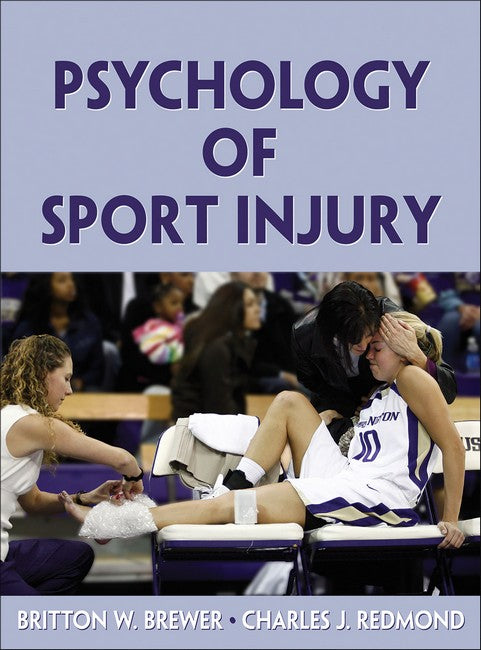Britton W. Brewer, PhD, is a professor of psychology at Springfield College, where he has taught graduate and undergraduate classes and conducted research on psychological aspects of sport injury since 1991. He is a fellow of the American Psychological Association and the Association of Applied Sport Psychology and a certified consultant with the Association of Applied Sport Psychology. He has edited four books on sport psychology, authored or coauthored more than 100 articles in refereed journals (approximately 40 percent of which are on topics related to the psychology of sport injury), and authored or coauthored 28 book chapters (more than half of which are on topics related to the psychology of sport injury). He has been awarded more than $1,000,000 in grant funding from the National Institute of Arthritis and Musculoskeletal and Skin Diseases for his research on psychological aspects of anterior cruciate ligament (ACL) surgery and has received research awards from Divisions 22 (Rehabilitation Psychology) and 47 (Exercise and Sport Psychology) of the American Psychological Association. Charles J. Redmond, MS, MEd, ATC, LAT, PT, is professor emeritus of exercise science and sport studies and retired dean of the School of Health, Physical Education and Recreation at Springfield College, where he has been a member of the faculty since 1969. He has extensive clinical, teaching, and administrative experience in athletic training and has served in multiple leadership positions in the National Athletic Trainers' Association. He received the Most Distinguished Athletic Trainer Award from the NATA in 1994 and was inducted into the NATA Hall of Fame in 2004. He has also been inducted into the Athletic Trainers of Massachusetts Hall of Fame and the Springfield College Athletic Hall of Fame. He served on the editorial advisory board of Athletic Therapy Today from 1995 to 2005, during which he was theme editor for issues such as eating and exercise disorders, psychosocial factors and athletic therapy, and advances in the management of patellofemoral pain. He has given presentations and conducted workshops on a variety of topics in sport health care, including the psychology of sport injury.
Request Academic Copy
Please copy the ISBN for submitting review copy form
Description
Part I. Understanding and Preventing Sport Injuries Chapter 1. Biopsychosocial Foundations of Sport Injury A Biopsychosocial Perspective on Sport Injury Biological Foundations of Sport Injury Psychological Foundations of Sport Injury Social Foundations of Sport Injury Biopsychosocial Analysis Summary Chapter 2. Antecedents of Sport Injury Models of Sport Injury Occurrence Psychosocial Predictors of Sport Injury Mechanisms of Psychosocial Influence on Sport Injury Occurrence Biopsychosocial Analysis Summary Chapter 3. Sport Injury Prevention Types of Prevention Models of Sport Injury Prevention Sport Injury Prevention Content Categories Biopsychosocial Analysis Summary Part II. Consequences of Sport Injury Chapter 4. Psychological Responses to Sport Injury Models of Psychological Response to Sport Injury Psychological Consequences of Sport Injury Biopsychosocial Analysis Summary Chapter 5. Pain, Sport, and Injury Definitions of Pain Types of Pain Dimensions of Pain Measurement of Pain Models and Theories of Pain Factors Associated with Pain in Sport Interpreting and Acting on Sport-Related Pain Biopsychosocial Analysis Summary Part III. Rehabilitation of Sport Injury Chapter 6. Adherence to Sport Injury Prevention and Rehabilitation Programs Adherence to Sport Injury Prevention Programs Adherence to Sport Injury Prevention Programs Consequences of Adherence to Sport Injury Prevention and Rehabilitation Programs Biopsychosocial Analysis Summary Chapter 7. Psychological Factors in Sport Injury Rehabilitation Sport Injury Rehabilitation Outcomes Charting a Course from Psychological Factors to Sport Injury Rehabilitation Outcomes Psychological Readiness to Return to Sport Biopsychosocial Analysis Summary Chapter 8. Psychological Interventions in Sports Health Care Psychological Interventions in Sports Health Care Biopsychosocial Analysis Summary Part IV. Communication in Sport Injury Management Chapter 9. Communicating with Patients Context of Patient-Practitioner Communication in Sports Health Care Models of the Patient-Practitioner Relationship in Sports Health Care Congruence of Patient-Practitioner Perceptions in Sports Health Care Factors Affecting Patient-Practitioner Communication in Sports Health Care Biopsychosocial Analysis Summary Chapter 10. Referring Athletes for Psychological Services Definition of and Rationale for Referral of Athletes for Psychological Services Socioclinical Context of Referral of Athletes for Psychological Services Reasons for Referral Referral Process Biopsychosocial Analysis Summary
"This text clearly fills a need. As injury management has become more evidence-based from a physical standpoint, more information to address the psychological aspects of injury are needed to complement this approach." -Kent Scriber, EdD, ATC, PT, FNATA-- Ithaca College

